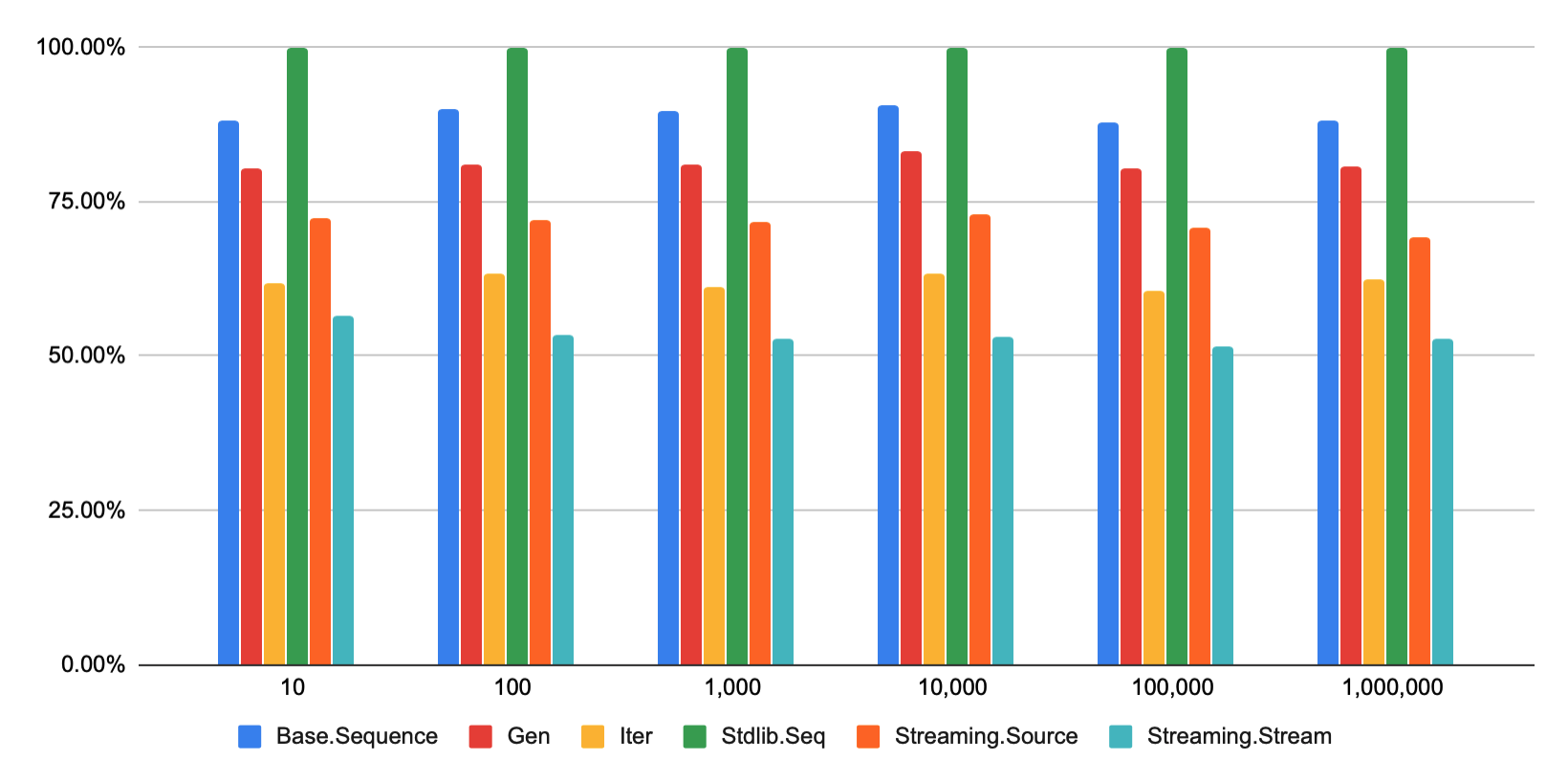An ongoing effort to understand and document the performance characteristics of streaming models available for OCaml.
The results for the benchmarks presented here were run on a MacBook Pro with the 2.6 GHz 6-Core Intel Core i7 CPU.
The benchmarks were built with the flambda variant of the 4.10 compiler with th -unbox-closures -O3 flags.
The table below contains normalized execution times for a benchmark that combines the following operations: unfold, map, filter, take, flat_map and fold. The code can be found in src/Cases.ml. Only some of the models are included in the benchmark results below.
| Input length | Streaming.Source | Gen | Base.Sequence | Stdlib.Seq | Streaming.Stream | Iter |
|---|---|---|---|---|---|---|
| 10 | 72.24% | 80.41% | 88.12% | 100.00% | 56.57% | 61.61% |
| 100 | 71.95% | 80.89% | 89.91% | 100.00% | 53.43% | 63.19% |
| 1,000 | 71.75% | 81.13% | 89.60% | 100.00% | 52.88% | 61.02% |
| 10,000 | 72.81% | 83.24% | 90.59% | 100.00% | 52.96% | 63.44% |
| 100,000 | 70.72% | 80.36% | 87.80% | 100.00% | 51.51% | 60.41% |
| 1,000,000 | 69.32% | 80.53% | 88.02% | 100.00% | 52.63% | 62.49% |
Lower values mean faster execution time.
Detailed benchmark results for different operations can be found here.
All the models presented here were implemented from scratch in this repository to provide a clean reproducible environment and consisten compilation flags.
Model used in Stdlib.Seq. This is an iterator similar to lists albeit lazy, protected with a thunk.
type +'a node =
| Nil
| Cons of 'a * 'a t
and 'a t = unit -> 'a nodeModel used in Streaming.Source.
Iterators based on the "unfold" function. They put an explicit state in the
type making them easy to implement and reason about. The _k and _safe
variants attempt to implement them using CPS and add resource handling.
(* Pull_cursor *)
type +'a t = Iter : 's * ('s -> ('a * 's) option) -> 'a t
(* Pull_cursor_k *)
type ('a, 's) iter = {
init : 's;
next : 'r . ('a -> 's -> 'r) -> 's -> (unit -> 'r) -> 'r;
}
type 'a t = Iter : ('a, 's) iter -> 'a t
(* Pull_cursor_safe *)
type 'a t =
Iter : {
init : unit -> 's;
next : 'r . ('a -> 's -> 'r) -> (unit -> 'r) -> 's -> 'r;
stop : 's -> unit;
} -> 'a tModel used in Gen. This is a simple pull iterator similar in spirit to Pull_cursor but without explicit state. The implementation of combinators is forced to used mutable state for control management.
Model used in
Base.Sequence.
This iterator is very well known for being used as a "stream fusion" mechanism
for Haskell lists. It is structurally similar to Pull_cursor but has an extra
variant for skipping elements.
type ('a, 's) step =
| Done
| Skip of 's
| Yield of 'a * 's
type +_ t =
Stream : 's * ('s -> ('a, 's) step) -> 'a tModel used in Streaming.Stream. A
push-based iterator with great performance and built-in resource handling. This
implementation is inspired by Clojure's transducers. It can be thought of as
"fold fusion with resource handling" The Push_reducer_stop variant encodes
termination in reducers as a variant value instead of using a boolean.
(* Push_reducer_bool *)
type ('a, 'b) reducer =
Reducer : {
init : unit -> 'acc;
step : 'acc -> 'a -> 'acc;
full : 'acc -> bool;
stop : 'acc -> 'b;
} -> ('a, 'b) reducer
type 'a t =
{ reduce : 'r . ('a, 'r) reducer -> 'r }
type 'a reduced = Done of 'a | Continue of 'a
type ('a, 'r) reducer =
Reducer : {
init : 's;
step : 'a -> 's -> 's reduced;
stop : 's -> 'r;
} -> ('a, 'r) reducer
type 'a t = { run : 'r . ('a, 'r) reducer -> 'r}A fold with termination that can be fused to created nested computations that
form streams. Similar in spirit to Push_reducer_bool, but lacks resource
handling. Writing combinators in this style is somewhat complicated.
type 'a t = { run : 'r . ('r -> 'a -> 'r option) -> 'r -> 'r }Model used in Iter. This is a very simple push-based iterator. It has excellent performance and supports efficient concatentation and unzipping. Its minimal interface imposes the use mutations and exceptions for control management. It also lacks support for resource handling.
type 'a t = ('a -> unit) -> unitThe benchmarks are configured with environment variables:
- STREAMS_BENCHMARK=all|all_no_flat_map|all_no_take|fold|map|filter|flat_map|take
- STREAMS_LENGTH=int (input length)
- STREAMS_LIMIT=int (used for take)
Run the benchmark with:
$ (export STREAMS_BENCHMARK=all; \
export STREAMS_LENGTH=500000; \
export STREAMS_LIMIT=250000; \
opam exec --switch=4.10.0+flambda -- dune exec -- ./src/Cmd_core_bench.exe -quota 10 -ascii)
benchmark=all length=500000 limit=250000
Estimated testing time 1m (6 benchmarks x 10s). Change using '-quota'.
Name Time/Run mWd/Run mjWd/Run Prom/Run Percentage
------------------ ---------- ---------- ------------ ------------ ------------
Streaming.Source 44.61ms 79.00Mw 2_829.65w 2_829.65w 70.47%
Gen 51.50ms 41.67Mw 2_361.78w 2_361.78w 81.36%
Base.Sequence 55.85ms 100.17Mw 5_800.13w 5_800.13w 88.23%
Stdlib.Seq 63.30ms 130.33Mw 13_329.49w 13_329.49w 100.00%
Streaming.Stream 31.88ms 32.00Mw 1_785.02w 1_785.02w 50.36%
Iter 45.66ms 30.00Mw 782.29w 782.29w 72.13%
Alternatively use the ./run.sh script to run benchmarks for different input sizes.
